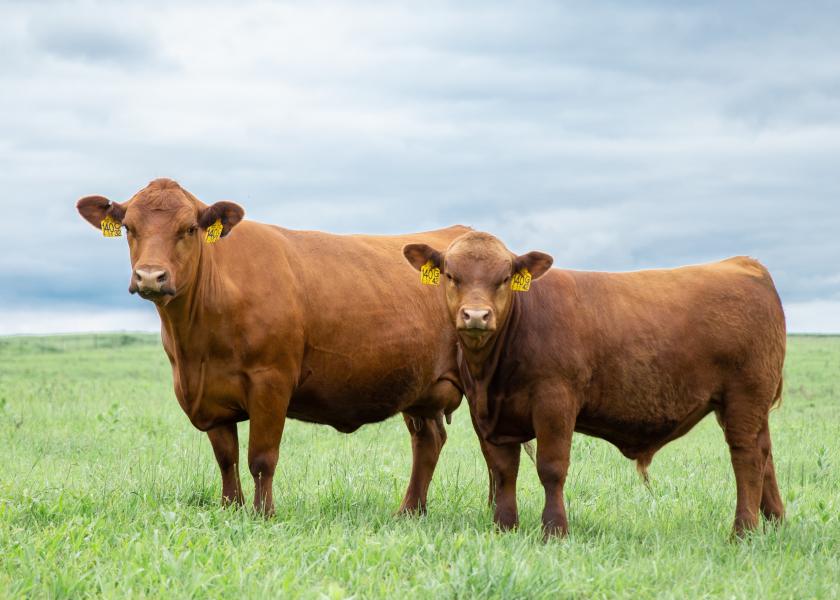Cow Power Delivers Validation and EPD Accuracy

Dr. Bob Weaber, Kansas State University, shares the merit and value of establishing "Cow Power", a female genotyping project that is a collaborative effort between the American Gelbvieh Association (AGA), American Gelbvieh Foundation (AGF) and Neogen to increase the number of genotypes and phenotypic information on females in the AGA herdbook. The information allows producers to make data-driven female selections for their herd on an ongoing basis.
Weaber, who serves as a genetics consultant for the AGA, says that collecting genotypic information from cow herds is an excellent way to establish and maintain validated, parent-verified pedigrees on cows in the herd.
He says that the true value of the Cow Power project is found in genotyping because of the significant amount of information it adds to the genetic evaluation system.
"The accuracies of the EPDs on those females improve to provide more precise breeding opportunities for those cows," he says. "By gathering the genomic information, we get more information about that cow's genetic potential and her lifetime production. Genotyping cows or heifers early in their life provides opportunities for more precise breeding of those females, and genotyping allows us to track out a cow's trajectory and your herd's trajectory for genetic trends using that genomic information."
Weaber shares that even in well-managed herds, somewhere between five and ten percent of the pedigrees are incorrect. And while he says those discrepancies aren't anyone's fault, they do impact the accuracies of the EPDs that are calculated from those animals. The Cow Power project is instrumental in resolving pedigree discrepancies, allowing producers to know what the pedigree is, and providing accurate values for EPD calculation.
Not only does the information collected help to strengthen the AGA's database and improve genetic predictions, members will also see benefit by having this information collected on their own cowherd. Because females typically only have one calf per year, it can take years before data is collected on even just a handful of her progeny. For traits such as weaning weight and yearling weight, a genomic test can offer as much information as having 25 calves on the ground. For marbling and back fat, it's the equivalent of having 10 progeny reported for those traits. Having this type of information on every female in the herd not only helps increase the accuracy of the EPDs but allows producers the knowledge to make more informed breeding and selection decisions.
Producers who participate and remain engaged in the Cow Power project will have access to the research to genotype replacement heifers. If a producer has submitted 90% of the genotypes for mature cows, along with mature body weight and body condition score in the first year, the member will be eligible to submit replacement heifers annually at the research price as long as the project continues. A minimum of 90% of the replacement heifers must be tested to receive research pricing.
"Cow Power allows you to plot your own destiny through the use of genomic information, which allows you to select heifers that go into the replacement pen – you can really key in on those important traits based on a heifer's EPDs and genomic information," he says. "From an association perspective, genotyping a broader group of animals in the population creates a greater representation of all the genotypes in the total herd. That data allows us at the research level and at the genetic evaluation level to do a better job of documenting differences in genetics because of the broader sampling."
Weaber says that current pricing also makes the Cow Power project attractive and encourages producers to invest in their herds by utilizing the technology.
With generous support from the American Gelbvieh Foundation, the Cow Power project is now offering a lower price for the genomic test. Through participation in the project, members have the opportunity to receive a research price of $20 for a GGP-100k genomic test on females to DNA test at least 90% of their current active cow inventory. Additionally, participants who submit both mature weights and body condition scores electronically on at least 90% of the current active cow inventory will receive an additional one-time $4 rebate per head. Thus, all females can receive a GGP-100k genomic test for only $16. For just $1 more than a parentage test, members are encouraged to take advantage of this incredible opportunity and learn about the cow power in their herd.
To enroll in the Cow Power Project, contact the AGA office at 303-465-2333 or visit Gelbvieh.org.
The American Gelbvieh Association is a progressive beef cattle breed association representing 1,100 members and approximately 40,000 cows assessed annually in a performance-oriented total herd reporting system.







